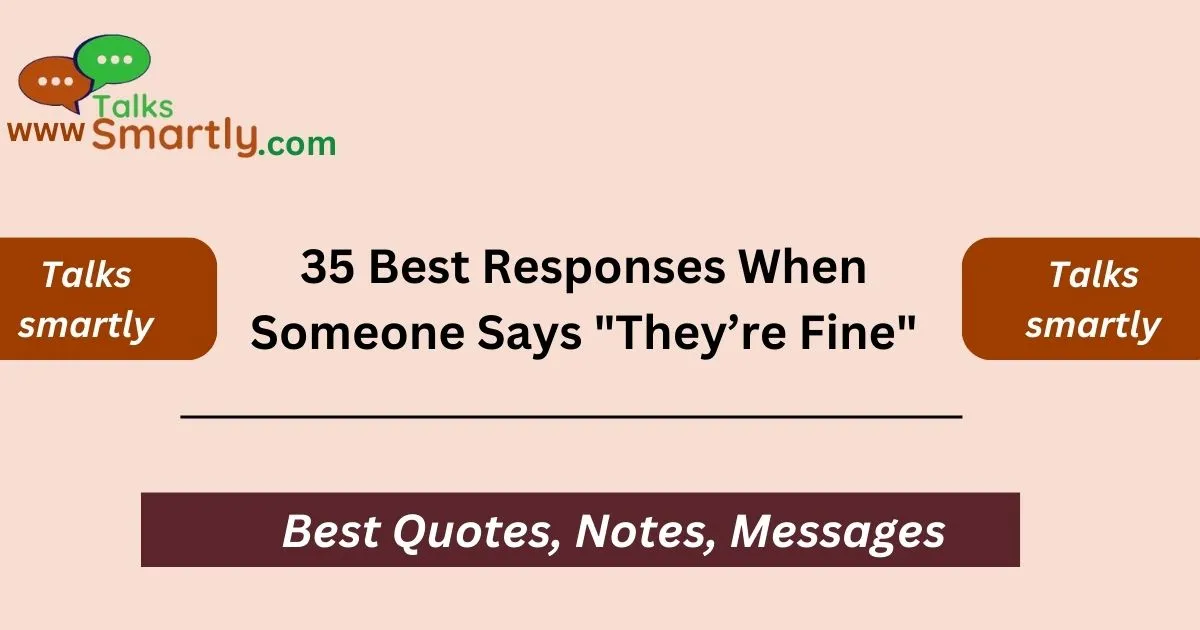“Knowing how to respond when someone says ‘I’m fine’ can open doors to deeper conversations and understanding.”
It’s common to ask someone how they are doing, and just as common to hear the simple reply, “I’m fine.” But what does “fine” really mean? Sometimes, it’s a way of brushing off deeper feelings or avoiding a conversation.
Understanding how to respond in these moments can help you offer the right support and connect on a more meaningful level. By offering thoughtful responses, you can help create a space where people feel comfortable opening up.
If you’ve ever found yourself unsure of what to say when someone tells you they’re fine, you’re not alone. Many of us struggle with knowing how to approach these moments. Should you probe further? Or respect their privacy?
The right approach depends on the person and the situation, but having a toolkit of thoughtful responses can make a world of difference in showing empathy and care.
In this post, we’ll explore 35 of the best responses you can use when someone says they’re fine. From gentle prodding to offering comfort, you’ll find ways to help those around you feel more understood and supported.
Being prepared with the right words can turn an ordinary conversation into a meaningful dialogue that strengthens relationships.
35 Outline Best Responses When Someone Says “They’re Fine
1. “Are you really fine?”
2. “It’s okay if you’re not.”
3. “Do you want to talk about it?”
4. “I’m here for you if you need me.”
5. “Is there anything I can do to help?”
6. “You don’t have to be ‘fine’ all the time.”
7. “You can tell me if something’s wrong.”
8. “It’s okay to feel whatever you’re feeling.”
9. “You don’t have to pretend with me.”
10. “I’m happy to listen if you want to share.”
11. “You don’t have to go through this alone.”
12. “Your feelings are valid.”
13. “It’s okay to not have everything figured out.”
14. “I understand if you don’t want to talk right now.”
15. “We can take our time, no rush.”
16. “You can always come to me when you’re ready.”
17. “I’m not going anywhere.”
18. “You seem like you have a lot on your mind.”
19. “You don’t have to carry this all by yourself.”
20. “I’m here whenever you need me.”
21. “I care about what you’re going through.”
22. “It’s okay to ask for help.”
23. “You don’t need to have all the answers right now.”
24. “Let’s talk when you feel comfortable.”
25. “Your feelings matter to me.”
26. “I get it, sometimes ‘fine’ isn’t really fine.”
27. “I respect your space, but I’m here when you need me.”
28. “I know things might be tough.”
29. “Even if you don’t want to talk, I’m still here.”
30. “It’s okay to take a break from everything.”
31. “Take your time, there’s no pressure.”
32. “You don’t have to explain everything.”
33. “I’ve been there too, and I’m here for you.”
34. “It’s okay if you’re feeling overwhelmed.”
35. “Whatever you’re feeling, I’m here to listen.”
1. “Are you really fine?”
This is a simple, direct question that lets the person know you’re genuinely concerned. It gives them the chance to clarify their feelings if “fine” was just a way to avoid a deeper conversation.
For example: If someone says, “I’m fine,” you can follow up with, “Are you really fine, or is something bothering you?” It shows you care enough to dig a little deeper.
2. “It’s okay if you’re not.”
This phrase reassures the person that they don’t need to put on a brave face. It opens the door for them to be honest about how they’re really feeling.
For example:For instance, if they say, “I’m fine,” you can respond with, “It’s okay if you’re not. We all have tough days.”
3. “Do you want to talk about it?”
Offering the chance to talk signals that you’re ready to listen whenever they feel comfortable. It’s an invitation, not a demand.
For example:If someone says, “I’m fine,” you might reply, “If you want to talk about it, I’m here.” This keeps the conversation open.
4. “I’m here for you if you need me.”
This statement lets the person know you’re available without pushing them to talk immediately. It provides comfort knowing someone is there for them.
For example: After hearing, “I’m fine,” you can say, “I’m here for you, whenever you’re ready.”
5. “Is there anything I can do to help?”
Asking this shows your willingness to offer more than just words—it tells the person you’re ready to take action to support them.
For example:If they say, “I’m fine,” you can follow up with, “Is there anything I can do to make things easier for you?”
6. “You don’t have to be ‘fine’ all the time.”
This response removes the pressure of always having to appear strong or okay. It’s a way of letting them know it’s okay to not be okay.
For example: if someone says, “I’m fine,” you might say, “You don’t always have to be fine. It’s okay to let your guard down.”
7. “You can tell me if something’s wrong.”
This response encourages honesty. It reassures the person that they don’t need to hide their struggles from you.
For example:For instance, if they respond with “I’m fine,” you can gently say, “It’s okay to tell me if something’s wrong.”
8. “It’s okay to feel whatever you’re feeling.”
This phrase acknowledges that all emotions are valid and that they don’t need to feel guilty for how they feel.
For example:If they say, “I’m fine,” you might reply, “It’s okay to feel however you’re feeling, even if it’s not fine.”
9. “You don’t have to pretend with me.”
This lets the person know they can be themselves around you without feeling the need to put on a mask.
For example: if someone says, “I’m fine,” you can respond with, “You don’t need to pretend around me. It’s okay to be real.”
10. “I’m happy to listen if you want to share.”
This response shows your openness to hear what they have to say without forcing them to talk before they’re ready.
For example:If they reply with, “I’m fine,” you can follow up by saying, “I’m happy to listen if you feel like sharing later.”
11. “You don’t have to go through this alone.”
This statement reassures them that they have your support no matter what they’re dealing with.
For example:For instance, after hearing “I’m fine,” you might say, “Whatever it is, you don’t have to go through it alone.”
12. “Your feelings are valid.”
By saying this, you validate their emotions, making them feel seen and understood even if they haven’t fully opened up yet.
For example:If they say, “I’m fine,” you can respond with, “Whatever you’re feeling, it’s valid.”
13. “It’s okay to not have everything figured out.”
This gives them permission to be uncertain or confused about things, reminding them that nobody has everything under control.
For example: if they respond with “I’m fine,” you might say, “It’s okay to not have everything figured out right now.”
14. “I understand if you don’t want to talk right now.”
This shows respect for their boundaries and gives them space to decide when they’re ready to open up.
For example:If they say, “I’m fine,” you can reply with, “That’s okay, I understand if you’re not ready to talk.”
15. “We can take our time, no rush.”
This statement lets them know there’s no pressure to resolve their feelings immediately, offering a more relaxed approach.
For example:For instance, if someone says, “I’m fine,” you can respond, “We can take our time, there’s no rush to talk about it.”
16. “You can always come to me when you’re ready.”
This reassures them that you’ll be there when they feel comfortable opening up.
For example:If they reply with “I’m fine,” you might say, “You can come to me whenever you’re ready to talk.”
17. “I’m not going anywhere.”
This simple, reassuring phrase lets them know you’ll stay by their side no matter what.
For example: if someone says, “I’m fine,” you can follow up with, “Just know, I’m not going anywhere.”
18. “You seem like you have a lot on your mind.”
This gentle observation shows that you’ve noticed something’s bothering them, offering them the opportunity to share.
For example: If they say, “I’m fine,” you might reply, “It seems like you’ve got a lot on your mind. Do you want to talk?”
19. “You don’t have to carry this all by yourself.”
This response reminds them that they don’t have to bear their struggles alone, even if they haven’t shared what’s bothering them yet. It encourages them to open up when they’re ready.
For example, if they say, “I’m fine,” you might reply, “You don’t have to handle this on your own. I’m here to help if you need it.”
20. “I’m here whenever you need me.”
This is a gentle reminder that you’re always available, even if they don’t feel like talking right now. It helps establish trust and lets them know they can reach out at any time.
For example:If they respond with “I’m fine,” you can say, “That’s okay, but I’m here whenever you feel ready to talk.”
21. “I care about what you’re going through.”
This statement shows genuine concern and helps the person feel valued. It can encourage them to share more about what’s really going on.
For example:For instance, after hearing “I’m fine,” you could say, “I just want you to know that I care about what you’re going through.”
22. “It’s okay to ask for help.”
Sometimes people feel like they need to manage everything on their own. This response reassures them that seeking help is perfectly fine and even encouraged.
For example: if someone says, “I’m fine,” you might respond with, “It’s okay to ask for help, you don’t have to do everything on your own.”
23. “You don’t need to have all the answers right now.”
This phrase takes the pressure off them to have everything figured out. It reassures them that it’s okay to be in a place of uncertainty.
For example:If they say, “I’m fine,” you can reply, “It’s okay if you don’t have everything figured out right now. I’m here if you need support.”
24. “Let’s talk when you feel comfortable.”
This offers them space without making them feel like they need to talk immediately. It shows patience and understanding.
For example:If they respond with “I’m fine,” you can say, “That’s okay, we can talk whenever you feel comfortable.”
25. “Your feelings matter to me.”
This statement acknowledges their emotions and helps validate what they’re going through, even if they aren’t ready to share yet.
For example:For instance, after hearing “I’m fine,” you might say, “Your feelings matter to me, and I’m here for you.”
26. “I get it, sometimes ‘fine’ isn’t really fine.”
This empathetic response shows that you understand the complexity of emotions and that “fine” might be a placeholder for something deeper.
For example:, if someone says, “I’m fine,” you can respond, “I understand, sometimes ‘fine’ means something else.”
27. “I respect your space, but I’m here when you need me.”
This response balances respecting their need for space while still offering support. It helps them feel less pressured but reassured that you’re available.
For example:If they say, “I’m fine,” you might say, “I respect your space, but just know I’m here if you need anything.”
28. “I know things might be tough.”
This phrase acknowledges that things may not be as “fine” as they’re saying, without pushing them to talk if they’re not ready.
For example:For instance, if someone says, “I’m fine,” you could respond, “I understand that things might be tough right now.”
29. “Even if you don’t want to talk, I’m still here.”
This reassures them that your presence isn’t conditional on whether they open up. It can help them feel supported without feeling forced to talk.
For example:If they say, “I’m fine,” you might respond, “That’s okay, even if you don’t want to talk, I’m here.”
30. “It’s okay to take a break from everything.”
This phrase lets them know it’s okay to step back from life’s pressures and take care of themselves. It gives them permission to slow down.
For example: If someone says, “I’m fine,” you can reply, “It’s okay to take a break from everything and just focus on yourself for a bit.”
31. “Take your time, there’s no pressure.”
This response gives them space to open up on their own terms, removing any sense of urgency from the conversation.
For example:If they say, “I’m fine,” you can respond, “Take your time, there’s no pressure to talk before you’re ready.”
32. “You don’t have to explain everything.”
This phrase reassures them that they don’t need to have all the answers or fully explain what’s going on. It takes some of the pressure off.
For example:For instance, if they say, “I’m fine,” you can reply, “You don’t have to explain everything, but I’m here if you want to talk.”
33. “I’ve been there too, and I’m here for you.”
Sharing that you’ve experienced similar feelings can help them feel less alone and more comfortable opening up.
For example:If they respond with “I’m fine,” you might say, “I’ve been there too, and I’m here for you when you need me.”
34. “It’s okay if you’re feeling overwhelmed.”
This response normalizes feelings of being overwhelmed, letting them know it’s okay to admit when things are tough.
For example: if someone says, “I’m fine,” you could say, “It’s okay if you’re feeling overwhelmed right now. I’m here to help.”
35. “Whatever you’re feeling, I’m here to listen.”
This phrase offers unconditional support and signals that no matter what they’re going through, you’re ready to listen when they’re ready to share.
For example:If they respond with “I’m fine,” you can reply, “Whatever you’re feeling, I’m always here to listen whenever you want to talk.”
Key Insight
- Why do people say “I’m fine” when they’re not?
People often say “I’m fine” to avoid discussing their emotions, either because they don’t want to burden others or they’re not ready to open up. - How can I tell if someone is really fine or not?
Look for non-verbal cues like body language, facial expressions, or tone of voice. If something feels off, they might not be as fine as they say. - What if they don’t want to talk, even after I ask?
Respect their boundaries. Let them know you’re available when they’re ready, but don’t push them to talk before they feel comfortable. - What’s the best way to offer support without making someone uncomfortable?
Be gentle and non-intrusive. Use responses that show empathy and care without putting pressure on them to open up immediately. - How do I know when to give someone space?
Pay attention to their responses. If they seem withdrawn or hesitant, it might be a sign that they need space, but make sure they know you’re there when they’re ready.
Conclusion
When someone says they’re “fine,” it’s often a sign that they may not be ready or comfortable enough to share what’s really on their mind. By offering thoughtful, empathetic responses, you can create a space where they feel safe to open up when the time is right.
Whether they need space or a listening ear, being there for them in these moments can help strengthen your connection and make a lasting impact.












